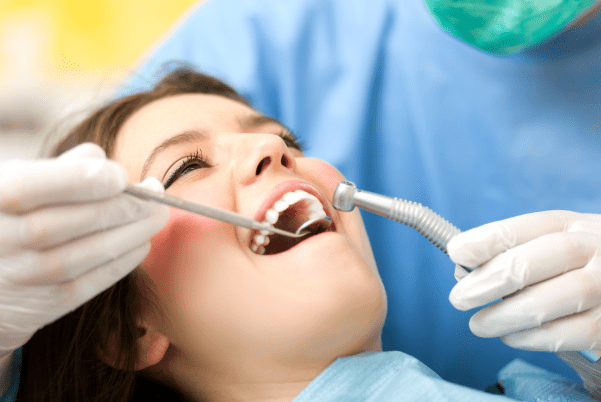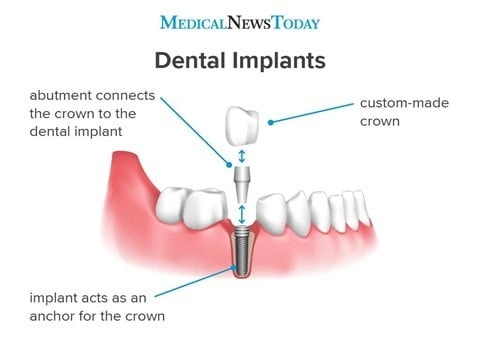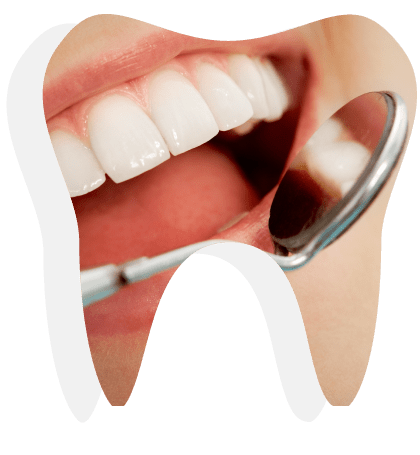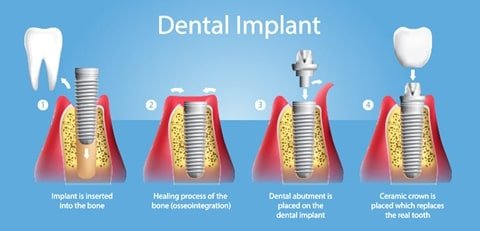What are Dental Implants?
A dental implant is one of the more permanent solutions to replacing missing teeth. Shaped like small screws, they serve the same function as your natural tooth root and to provide a strong foundation for an artificial tooth. Dental implants are typically made of titanium and surgically inserted into the jawbone.
There are benefits to choosing dental implants over other teeth replacement options, such as not having to rely on neighbouring teeth unlike removable bridges or dentures. Implants have added benefits of strengthening existing jawbone.

Dental Implant Structure
The entire structure of a typical single tooth dental implant is as follows:

Fixture (Implant)
The implant fixture is shaped like a screw and is composed of either medical-grade titanium or ceramic. This is surgically placed into your jaw bone to replace the root of your natural teeth.
Abutment (Connector)
The implant abutment (connector) is a small nugget that attaches to the implant fixture. It connects the implant fixture to the implant prosthesis.
Prosthesis (Crown)
The implant prosthesis forms the most superficial part of the implant that replaces a lost tooth or lost teeth/tissues.
It can come in various forms such as:
Crown (Replaces as a Single Tooth)

Bridge (Replaces a Few Teeth)

Denture (Replaces Several Teeth)

*This is a removable appliance
After the Dental Surgery
RECOVERY & FOLLOW UP
After your dental implant surgery, you may experience some of the typical discomforts associated with any type of dental surgery, such as:
- Swelling of your gums and face
- Bruising of your skin and gums
- Pain at the implant site
- Minor bleeding
You may need pain medications or antibiotics after dental implant surgery. After each stage of surgery, you may need to eat soft foods while the surgical site heals.
Benefits of Dental Implants
Dental implants have always been seen as an effective and viable solution to replacing missing teeth in Singapore. Dental implants also serves as a permanent solution with minimum downsides, thus, improving your quality of life and self-confidence.
Unlike dentures, they do not slip in and out of their position, making it a stable, reliable option. Also, unlike bridges, they do not rely on the support of the surrounding teeth. There are multiple other benefits of having dental implants over other methods of replacing missing teeth, such as:
1. Feels Like Natural Teeth
Implants are anchored firmly in your jaw bone, providing a strong foundation for the artificial prosthesis (crown of the tooth). This makes it a sturdy teeth replacement option, allowing you to carry out your daily activities, like eating and talking, with ease. Dental implants can feel almost exactly like your natural teeth, allowing you to eat, drink, and talk as you normally would.
Compared to removable options, like dentures or dental bridges, which can slip in and out of their position, implants are not removable and are secure.
Also, implants do not need to be removed and cleaned in the way dentures and bridges need to be.
2. High Success Rate & Potential to Last a Lifetime
Studies have shown that dental implants have a high success rate, lasting for 10+ years on average.
Titanium metal implants are known to last a lifetime and can outlive their artificial tooth crown, which needs to be replaced every 25 years.
Several factors affect the lifespan of your dental implants including how well you care for them, your lifestyle and habits, the density of your jawbone and the position of the tooth along the jaw arch.
For example, having low jawbone density and habits such as smoking reduces the success rate of implant surgery.
3. Not Supported By Surrounding Teeth
The fixtures of implants (screws), surgically placed into your jawbone, support and hold the artificial tooth crown.
This is unlike in a tooth-supported bridge or denture, where the surrounding teeth function as the supportive pillar, keeping the artificial teeth in place. Neighbouring teeth are therefore not overstrained by these structures, hence avoiding teeth cracking or being worn down over time.
4. Avoids Problems Associated with Missing Teeth & Prevents Jawbone Loss
Having missing teeth is not just a cosmetic problem. It also causes teeth to shift and for over-crowding and gaps to occur, hindering your ability to floss and brush. This could lead to tooth cavities and decay occurring down the line. Gaps in the teeth also allow a cavity for food to be trapped and for plaque and bacteria to accumulate, which could eventually lead to gum recession.
Also, when a tooth is absent, it causes the jawbone and tissues surrounding it to atrophy and decrease in volume. This could affect the bone structure of one's face and change one facial appearance, making one look aged. Implants prevent bone loss and gum recession by stimulating the growth and development of the jawbone. Once the implant is placed, it functions like a natural tooth root, allowing the jawbone to grow well.
In this way, your facial structure is maintained, preventing premature ageing, and resulting in maintaining a youthful and vibrant facial appearance.
What are Wisdom Teeth?
Wisdom teeth, which are the third molars, are the very last teeth at the back of your mouth. are the last adult teeth to come into the mouth (erupt). Most people have four wisdom teeth at the back of the mouth — two on the top, two on the bottom.
If wisdom teeth erupt correctly and are otherwise healthy, they can help you chew. When wisdom teeth are in the process of erupting through the gums, it is normal for there to be some transient discomfort of pain. However, wisdom teeth can lead to problems if there isn’t enough space for them to surface or they come through in the wrong position.

Is it Possible to Keep Your Wisdom Teeth?
Wisdom teeth that are not removed should continue to be monitored because the potential for developing problems later on still exists. As people age, they are at greater risk for health problems—and that includes potential problems with their wisdom teeth. Be sure to, floss around your wisdom teeth and visit your dentist regularly. Regular dental visits allow your dentist to evaluate your wisdom teeth and your overall dental health.
Why You Might Need to Have Your Wisdom Teeth Removed
Every patient is unique, but in general, wisdom teeth may need to be removed when there is evidence of changes in the mouth such as:
- Pain
- Infection
- Cysts
- Tumours
- Damage to neighbouring teeth
- Gum disease
- Tooth decay (if it is not possible or desirable to restore the tooth)
Your dentist may also recommend removal of wisdom teeth as part of treatment for braces or other dental care.
Before making any decisions, your dentist will examine your mouth and take an x-ray. Together, you and your dentist can discuss the best course of treatment.
Wisdom Teeth Removal
In order to remove an impacted wisdom tooth, the dentist will execute the following procedures:
- Make an incision in the gum tissue to expose the tooth and bone
- Remove bone that blocks access to the tooth
- Divide the tooth into sections if it's easier to remove in pieces
- Remove the tooth in sections
- Clean the site of the removed tooth of any debris from the tooth or bone
- Stitch the wound closed to promote healing, though this isn't always necessary
- Places gauze over the extraction site to control bleeding and to help a blood clot form
What to Expect Post Surgery?
As you heal from your surgery, it is important to take note of the following:
Bleeding
Some oozing of blood may occur the first day after wisdom tooth removal. Try to avoid excessive spitting so that you don't dislodge the blood clot from the socket. Replace gauze over the extraction site as directed by your dentist or oral surgeon.
Pain Management
You may be able to manage pain with an over-the-counter pain reliever, such as acetaminophen (Tylenol, others), or a prescription pain medication from your dentist or oral surgeon. Prescription pain medication may be especially helpful if bone has been removed during the procedure. Holding a cold pack against your jaw also may relieve pain.
Swelling and Bruising
Use an ice pack as directed by your dentist or surgeon. Any swelling of your cheeks usually improves in two or three days. Bruising may take several more days to resolve.
Activity
After your surgery, plan to rest for the remainder of the day. Resume normal activities the next day, but for at least a week, avoid strenuous activity that might result in losing the blood clot from the socket.
Beverages
Drink lots of water after the surgery. Don't drink alcoholic, caffeinated, carbonated or hot beverages in the first 24 hours. Don't drink with a straw for at least a week because the sucking action can dislodge the blood clot from the socket.
Food
Eat only soft foods, such as yogurt or apple sauce, for the first 24 hours. Start eating semisoft foods when you can tolerate them. Avoid hard, chewy, hot or spicy foods that might get stuck in the socket or irritate the wound.
Cleaning Your Mouth
Don't brush your teeth, rinse your mouth, spit or use mouthwash during the first 24 hours after surgery. Typically you'll be told to resume brushing your teeth after the first 24 hours. Be particularly gentle near the surgical wound when brushing and gently rinse your mouth with warm salt water every two hours and after meals for a week.
Tobacco Use
If you smoke, don't do so for at least 72 hours after surgery — and wait longer than that if possible. If you chew tobacco, don't use it for at least a week. Using tobacco products after oral surgery can delay healing and increase the risk of complications.
Risks/Complications of Wisdom Tooth
Most wisdom tooth extractions don't result in long-term complications. However, removal of impacted wisdom teeth occasionally requires a surgical approach that involves making an incision in the gum tissue and removing bone. Rarely, complications can include:
- Due to the nature of the procedure, there may be facial swelling, discolouration of the overlying skin, pain, and jaw stiffness for up to 2 weeks after, so there may be a need to take time off from work or school. The symptoms are usually worse for the first three days and will gradually enhance.
- Painful dry socket, or exposure of bone when the post-surgical blood clot is lost from the site of the surgical wound (socket)
- Infection in the socket from bacteria or trapped food particles
- Damage to nearby teeth, nerves, jawbone or sinuses
There may be a possible risk of temporary or permanent altered sensations to your lower lip, cheek, or tongue from the removal of lower wisdom teeth. This risk varies according to the proximity of your wisdom tooth to your nerves. Your dentist will discuss this thoroughly with you during your initial consultation, with the help of an X-ray or Cone Beam Computed Tomography (CBCT) scan.
When Should You Contact Us After Your Surgery?
Call us if you experience any of the following signs or symptoms, which could indicate an infection, nerve damage or other serious complication:
- Difficulty swallowing or breathing
- Excessive bleeding
- Fever
- Severe pain not relieved by prescribed pain medications
- Swelling that worsens after two or three days
- A bad taste in your mouth not removed with saltwater rinsing
- Pus in or oozing from the socket
- Persistent numbness or loss of feeling
- Blood or pus in nasal discharge (for upper wisdom tooth removal)
FAQs
A Wisdom tooth surgery costs from $650 to $1550.
Wisdom tooth surgeries usually take between 30 mins – 60 mins per tooth but this is dependant on the complexity of the surgery.
You shouldn't feel any pain as your wisdom teeth are removed because the area will be numb. However, if you do feel pain during the procedure, tell your dentist or oral surgeon so they can give you anaesthetic.
Depending on your dentist, most patients will typically be given 5 days of MC after a wisdom tooth surgery.
Post surgery pain from a wisdom tooth surgery will typically last around 24 – 72 hours. Pain medicine will prescribed to all patients after the surgery.


